#linguistics in progress here
Explore tagged Tumblr posts
Text
university.. university leave me alone
#heres the situation: for my cognitive literary studies class (quite fun) we had to pick primary material and a cognitive angle to analyse it#from. and the deadline was coming up and i who have been thinking very intensely about robots for the last half a year picked#yeah you guessed it. fucking PIERS PLOWMAN. which is not fun for me but i panicked about the deadline#so now i have to do something about piers plowman and its cognitive literary properties#and im in hell this is hell i have been extremely stressed about piers plowman for a month. to the point where ive been in physical pain#AND I CANNOT. THINK OF ANYTHING. ABOUT PIERS PLOWMAN.#and the teacher for that class is so nice and chill and she was like you can pick anything at all. and i went with piers plowman#like it's interesting but from what COGNITIVE angle can i approach piers plowman.#ive been thinking about saying exactly this that piers plowman is more for historical linguists and theologists than narratologists but im#also positive plenty of scholars read piers plowman for the plot#so then i thought about the characters and whether you can Connect with them and whether they help you Immerse yourself in the story and#other terminology i learned in cognitive literary studies class.#theyre allegorical and very 1 dimensional and there could be something about whether we from 2024 understand them in the same way#people from the 14th century did. like this was what i put in my proposal when i made it#but now i actually have to make the slides and use cognitive literary papers for this and it's just not going at all. i cant do it.#i cant do anything i cant enjoy the daylight and the warmer weather i cant think about anything other than im not making progress on this#and it's bad for me!! it's bad for my health i feel bad. why did i go with piers plowman why did i not pick watership down#my post#i have plenty to say about watership downm cognitively.#also about old possums book of practical cats#maybe i could email her and tell her id like to change it.. no#ive also been reading the tombs of atuan which is incredible
18 notes
·
View notes
Text
More Amor




Summary: you are going out with Carlos, you can speak his language, but you don't tell him. You were hiding your abilities due to an insecurity about your ability.
Song: Friends · Chase Atlantic
Taglist: @random-bouts-of-randomness
Author’s note: Please like, reblog and share this! Also please follow for more! 🫶
Word count: 3.5k
MASTERLIST - F1

The roar of the engines was a constant lullaby in the Formula 1 paddock, a song that vibrated through your very bones. You loved it here, the controlled chaos, the palpable energy, the feeling of being part of something larger than yourself.
Your focus, however, was often drawn to a specific corner of the Ferrari garage – where Carlos Sainz, with his disarming smile and effortless charm, held court.
You and Carlos were friends for a long time. You found him incredibly easy to talk to, his enthusiasm infectious. You liked Carlos, perhaps more than you should.
But there was also a barrier, subtle but ever-present, that you yourself had erected. It was a secret you carried, one that gnawed at you with each passing day: you spoke fluent Spanish, his native tongue.
You hadn't always been this secretive. Back in school, Spanish had been your favorite subject, a fascination with the language and culture that had blossomed into fluency. There was a time when you'd have proudly displayed your linguistic prowess, but a few harsh critiques in a university language class, comments that chipped away at your confidence, had left you hesitant.
Now, you kept your Spanish a closely guarded secret, especially in the presence of Carlos. The thought of him, a native speaker, judging your accent or vocabulary was enough to send shivers of anxiety down your spine.
This particular afternoon, you were tucked away in the hospitality area, a small respite from the frenetic pace of the paddock. Charles Leclerc, Carlos’s teammate and another friend, was perched opposite you, nursing a bottle of water.
He was in a lighter mood after a good practice session and was keen for a diversion.
“So,” he said, his French accent thick, “teach me some more Spanish. The last phrase you taught me was very… useful.” He grinned mischievously, a glint in his eye.
You laughed, remembering the rather informal phrase you had taught him the previous day. “Okay, okay,” you said, pulling out your notebook. “Let’s try something a little less… provocative.”
You flipped to a fresh page. “How about ‘Es un placer conocerte’ – ‘It’s a pleasure to meet you’?”
You broke it down for him, pronunciation and all, your voice a soft murmur that was just audible above the ambient noise. He repeated the phrase several times, his brow furrowed in concentration until he finally managed something that was, while not perfect, definitely understandable.
“Magnifique!” you exclaimed, giving him an approving nod. He grinned, pleased with his progress, and began repeating the phrase to himself, practicing the rhythm and inflection.
Just as he did, a familiar voice spoke behind you. “Que estan haciendo ustedes?”
You froze, a chilling feeling spreading from the base of your neck. It was Carlos, standing in the doorway, a curious smile playing on his lips.
The Spanish he’d spoken was casual, his words rolling off his tongue as naturally as breathing. What are you guys doing?
A wave of panic washed over you. It was close, too close. He had heard you speaking Spanish, even if it was with Charles. Your secret, the one you had painstakingly guarded, was on the verge of unraveling.
Charles, completely oblivious to the tension thrumming in the air, turned to face Carlos, his face beaming. “‘Es un placer conocerte,’” he announced proudly, his accent thick but understandable.
You cringed internally. Oh no, Charles, no.
Carlos raised an eyebrow, his gaze shifting from Charles to you, a hint of amusement in his eyes. "Ah, I see. You're teaching Charles Spanish?"
You forced a smile, trying to appear casual. "Kind of," you said, your voice a little too high-pitched for your liking. "Just a few simple phrases for fun." You did not want to admit you'd been teaching him the basics.
Carlos crossed his arms, leaning against the doorframe as he observed you and Charles. “Well, that’s good,” he said, his Spanish accent taking over his English slightly. “It’s always good to learn new languages.” He was still looking at you, a playful glint in his eyes that made your heart pound.
You nodded, avoiding his gaze. “Yeah, absolutely.” You picked up your notebook and began flipping through it, pretending to be engrossed with your notes as if you didn’t already know every word you'd already written.
"What else have you taught him?" Carlos asked, stepping further into the room.
You tensed, your heart thumping wildly. “Oh, just basic stuff,” you said, your voice tight. You could feel the heat rising in your cheeks, and you wanted nothing more than to disappear. “You know, ‘hello,’ ‘goodbye,’ that sort of thing.” You hoped he didn’t see through your act.
Charles, bless his oblivious soul, was happily repeating the phrase he had learnt until it was as close to perfect as it could be. Carlos watched him, but his eyes were still on you.
He knew you were lying. He’d spoken to you in the past in Spanish and you had responded without so much as blinking. Why were you being like this?
“You sure?” he asked, a smirk dancing on his lips. He could see the panic in your eyes and the way your hands were clutching your notebook like a lifeline.
He looked at Charles again, and then back to you. “You speak a little Spanish?”
"No, I don't," you said quickly, a little too quickly. Your voice was far too high pitched. You hoped he didn't hear the fear that was leaking in your tone.
Carlos seemed to hesitate, his eyes scrutinizing yours for a moment longer. A subtle shift in his expression told you he knew you were lying, but he said nothing.
"Okay," he said finally, his tone still amused. "If you say so." He patted Charles on the shoulder. “Enjoy your lesson, Charles,” he said before turning and heading out of the room.
You breathed out the breath you didn’t realize you were holding. It had been too close. You watched him leave, your heart still beating fast. You were acutely aware that you needed to be more careful.
One more slip up like that and your secret wouldn’t be a secret anymore. You knew you should tell him, but your fear of not being good enough held you back.
Later that evening, while you were trying to text, a message popped up on your phone. It was from Carlos.
“Hey, you okay? You seemed a little… agitated earlier.”
You stared at the message, your mind swirling. He had noticed. Of course, he had. He was observant, perceptive. You hesitated before typing a response.
“Yeah, all good. Just a bit tired.”
He replied almost instantly. “Tired? Or hiding something? Maybe a secret language?”
You felt a jolt run through you. He was teasing you, playfully pushing at the edges of your lie. You took a deep breath and decided to deflect.
“Nah, just a very complicated article on tire degradation. Don’t let me keep you, you probably have more important things to do!”
A few seconds later, Carlos responded; “I always have time for you. By the way, you should try speaking more Spanish. It suits you.” He included a winking emoji in the text, leaving you completely frozen.
How did he know? You hadn’t said a single word in Spanish to him, apart from earlier when it was directed at Charles. He was definitely onto you.
Your heart started pounding in your chest. You didn’t know what to do. You finally replied with a simple “Night, Carlos” message and put your phone down.
You knew that sooner or later, you would have to face the truth. You liked Carlos, and you didn’t want to keep secrets from him. But the thought of that vulnerability, the risk of judgment, still held you captive.
You hoped one day you’d find enough courage to reveal your secret, to let Carlos in completely. But for now, you would keep your language locked behind a wall of fear, hoping that the wall would come tumbling down one day.
But for now, you had to keep up with the charade, and try not to let him see you were lying about knowing his native language.
︵‿︵‿୨♡୧‿︵‿︵
The leather armchair cradles you like a familiar friend. Sunlight, filtered through the lace curtains, dances across the spines of Carlos’s bookshelves, creating a warm, inviting atmosphere.
You’re in his living room, a space that feels as comfortable as your own, except for the subtle undercurrent of nervous energy that always seems to hum beneath your skin when you’re here.
Carlos, with his easy laugh and eyes that crinkle at the corners when he smiles, is the source of that familiar flutter in your chest.
He's gone to the market, a quick errand for the missing ingredient – ricotta cheese, if your shoddy Spanish comprehension served you correctly – needed for his legendary fluffy pancakes.
He'd called them “panqueques esponjosos” and the way his tongue rolled over the words had made your heart do a little tap dance.
You trace the rim of your teacup with your finger, the quiet ticking of the grandfather clock in the hallway the only sound. You pull your phone from your pocket, a small smile playing on your lips.
A message from Sofia, a friend from Spain pops up. You haven't seen her since the end of your vacation and you miss her friendly banter. You hadn’t told her that you knew Carlos at first. She was thrilled when you had finally spoken about him and also excited the day you finally felt comfortable enough to speak Spanish to her.
You dial her number.
"Hola, mi amiga!" Sofia's voice crackles through the speaker, warm and vibrant as always.
"Hola, Sofia! Como estas?" you reply, feeling the familiar comfort of the language wash over you. The words flow easily, a melody you've secretly nurtured for months.
You and Sofia slip into a comfortable rhythm, gossiping about mutual friends, discussing the latest drama in her life, and laughing about inside jokes from class. You tell her about how you’ve been spending a lot of time with Carlos recently, describing the comfortable silence that settles between you, the way he always offers you the first cup of tea, and the lingering glances that sometimes catch you off guard.
She’s always encouraged you to take the leap with Carlos, but you've always been too afraid of ruining the comfortable friendship you had.
"¿Y qué tal, el chico que te gusta? ¿Como va con Carlos?" Sofia asks, her voice teasing. And how about the boy you like? How is it going with Carlos?
"He's...he's good," you stumble, a flush rising to your cheeks even though Sofia can't see you. "He's making pancakes later." You hope it doesn’t sound as silly as it feels.
You are so aware of your own internal dialogue.
"Ooh, panqueques! Sounds romantic," Sofia giggles. “Maybe he will be speaking Spanish to you soon” she winks, she is completely aware that he doesn’t know you can speak Spanish.
You have not told her about the pet name he has given you.
"Don't be silly," you say, though a small part of you desperately wishes she were right. "He calls me a few names, it's kinda silly,"
Sofia chuckles, “he likes names?"
"Yeah, Cariño." you say quietly. It’s a term of endearment that sits in your chest like a warm coal, always threatening to ignite a fire. you feel your cheeks burn a deeper shade of pink.
"Ay, ay, ay! Cariño! That means 'darling'! He definitely likes you," Sofia says, her voice filled with excitement.
You laugh, trying to downplay the significance. "It's just a word, Sofia." Even as you say the words you know it isn’t true.
You adore the way he says it, the way his voice softens slightly when he addresses you as ‘cariño’. It feels intimate, a secret language woven into your friendship.
"No, amiga, it's not just a word. It's a feeling," Sofia counters, her voice knowing.
You are about to reply when you hear a thud. A bag, probably groceries, hits the floor with a soft, muffled sound. You turn, your heart leaping into your throat, to see Carlos standing in the doorway, his eyes wide with surprise.
His face, usually so open and inviting, is frozen in a state of shock. A second later he looks hurt.
His gaze is focused on you and he's holding the bag of groceries precariously in his hand as if he's forgotten that it is there. There's a strange mix of bewilderment and something else – hurt, maybe? – flickering in his eyes.
He stares at you, mouth slightly ajar, and no words are coming from him, which is so unlike Carlos to be lost for words.
You freeze, phone clutched in your hand, heart hammering against your ribs. The blood rushes to your ears and you suddenly feel as though you’re unable to breathe, feeling as though he’s looking at you differently.
The Spanish words, the comfortable rhythm of your conversation with Sofia, the comfortable feeling you had all but a moment ago evaporates into the air.
“Carlos…” you whisper, your voice sounding small and weak. You feel your cheeks burn and you can only imagine how red your face is.
He sets the other abag on the floor with a soft thud, the sound echoing in the suddenly charged silence. “You…you speak Spanish?” he asks, his voice barely a whisper.
The playful light in his eyes was gone, the crinkles that always appeared when he smiled did not appear this time.
You nod slowly, feeling a wave of shame wash over you. You feel sick at the thought of how he must feel, you should have told him. You should have shown him the real you sooner. “I do,” you managed to say.
You sat perched on the edge of Carlos's ridiculously plush sofa. Your heart was still thrumming a little too fast, admittedly by the man himself. Carlos.
He was pacing in front of you now. He ran a hand through his already tousled dark hair, the movement highlighting the sharp lines of his jaw.
“I still can’t believe you spoke it,” he said, his voice a low rumble.
You fidgeted, picking at a loose thread on the throw pillow next to you. “It’s not that big of a deal,” you mumbled, your gaze fixed on the intricate pattern.
The idea of speaking it, of letting it flow freely in front of anyone, especially him, had always filled you with a surprising amount of anxiety.
“Not a big deal?” He stopped pacing, planting his hands on his hips, his gaze finally locking with yours, a faint amusement dancing in his brown eyes.
“You mean the fact that you’ve been listening to me struggle through English for years, when you could have corrected me all this time, is ‘not a big deal’?”
A blush crept up your neck. You avoided his eyes again, feigning interest in the small water stain on the coffee table. “I… I wasn't correcting you on purpose.”
He chuckled, the sound warm and inviting. It melted the nervous knot in your stomach a little. He dropped down beside you on the sofa, the cushions giving way with a soft sigh.
He turned, his whole attention now focused on you. “So, why didn’t you? Why did you keep that amazing Spanish tucked away?”
You took a deep breath, the words tasting like lead in your mouth. “I guess… I wasn't confident enough,” you finally admitted, the admission feeling like a weight lifting off your chest, however slightly. “I wasn't sure about my accent. Or if I even sounded… right.”
His eyebrows furrowed slightly, and his hand reached out to gently touch your arm, his fingers sending a jolt of warmth through your skin.
He’d always had a way of making even the simplest touch feel charged. “Mi amor, you are always right. Never doubt that. And your accent… it’s beautiful,”.
You finally looked up at him, your eyes searching his for any hint of sarcasm, but finding only genuine sincerity. The term of endearment was a fresh shock, and it sent little shivers down your spine. “You really think so?” you asked, your voice barely a whisper.
He nodded, his thumb now tracing lazy circles on your skin. “Absolutely. It’s unique, and it's yours. It's part of what makes you, you." He leaned closer, his eyes boring into yours. "And I want to hear more of it.”
The air crackled, charged by the intensity of his gaze. You were acutely aware of the proximity between you, of the warmth emanating from his body, and the way his gaze lingered on your lips.
He'd managed to convince you to stay, the casual invitation coming after a day spent working with his team at the track. Your initial plan was always to return to your hotel, to maintain the comfortable distance that you had been living in.
But then you saw him, his hopeful expression and the puppy-dog pleading in his eyes and you found your resolve melting away. You told yourself it was the pull of shared language, the thrill of having someone that understood you; but deep down, you knew it was something far more profound and far more dangerous.
“Please,” he whispered, his voice a low, husky plea. “Speak more amor? Just a little bit.” His brown eyes, usually full of mischievousness, were now pools of earnest emotion.
You swallowed hard, feeling the heat creeping up your face again. “What… what do you want me to say?” you asked, the Spanish words a little hesitant at first.
A wide grin stretched across his face. “Anything. Tell me about your day. Tell me you think I’m the best driver on the grid,” he teased, his eyes sparkling with humor.
You laughed, the sound light and airy in the quiet space. "You're arrogant, tonto," you said, the Spanish rolling off your tongue with more ease than you expected.
His grin widened. “But you like me, arrogant and best driver?” he challenged.
"Perhaps," you replied, playfully avoiding his question. "It was a long day. I spent most of the morning working from home. Then, I had lunch with..." You trailed off, momentarily forgetting the English word for the person you had lunch with during the day.
"Your coach?" Carlos suggested, his gaze unwavering.
"Yes! My coach. We discussed the race strategy and went over some notes," you continued, the Spanish flowing much more easily now.
You felt a strange sense of liberation, of finally letting go of the fear that had been holding you back.
He listened intently, his head tilted slightly, his eyes never leaving yours. Every now and then, he would let out a small chuckle or offer a prompting question.
“And now?” he asked softly, interrupting you mid-sentence. “What are you going to do now?”
You glanced around his living room, its sleek lines and modern features a stark contrast to the cozy comfort of your small apartment.
"Now? I suppose... well, I guess I'm going to stay here." You held his gaze, each beat of your heart pounding in your chest.
He reached out, his hand cupping your cheek, his thumb softly stroking your skin. "You're perfect," he whispered, his voice barely above a breath. "You being here... it makes everything feel perfect."
You shivered, and it wasn’t from the cold. “Carlos…” you began, your voice trembling slightly.
He leaned in, his gaze locked on your lips making the moment feel charged with unspoken promises. “Just… say it, amor,” he whispered, his voice thick with emotion.
You closed the distance between you and pressed your lips against his. The kiss was everything you expected and far, far more. It was a melting pot of the connection you’d so desperately tried to suppress.
It was a declaration in a language both shared and unspoken. When you finally pulled away, you were breathless, your heart pounding against your ribs.
He looked at you, his eyes filled with a tenderness that made your heart ache. “Tell me in Spanish,” he murmured, his lips brushing against your ear, sending a shiver down your spine.
You took a shaky breath, finally letting the words flow freely, without reservation or fear. “Te quiero, Carlos,” you whispered, the words finally escaping your lips. I love you.
His response was immediate. His lips crashed against yours in another kiss, this one deeper, more passionate, and full of a raw, unfiltered emotion.
You pulled him closer, your arms wrapping around his neck, losing yourself in the moment, in him, in the magic of finally being understood, finally being heard, finally being loved in the most perfect language possible.
The fear, the insecurity you had carried for so long, seemed to dissolve, replaced by a dizzying rush of hope. You had found a home in his arms, in his eyes, and in the shared language that had brought you together.
And in that moment, in his arms, with the city twinkling outside the window, you knew, with absolute certainty, that you were exactly where you were meant to be. . . .

#carlos sainz x reader#carlos sainz 55#carlos sainz junior#carlos sainz x you#carlos#carlos sainz#f1 fanfic#f1 fic#f1 imagine#formula 1#formula one#f1 x reader#f1#cs55#cs55 x y/n#cs55 x reader#cs55 x you#cs55 imagine#cs55 fic#cs55edit#cs55 sf#carlos sainz x y/n#carlos sainz jr#scuderia ferrari#ferrari racing#ferrari f1
602 notes
·
View notes
Text

ADMIT IT, YOU WISH I WAS HERE.





✶ SPY REALITY
SUBJECT PROFILE
NAME: COOPER, MIKAELA ASTRID ALIAS(ES): MAC DOB: [REDACTED] (Est. Age: EARLY 20s) NATIONALITY: DUAL CITIZEN – FRANCE / UK FORMER AFFILIATIONS: MI6 (DISAVOWED), JOINT TASK FORCE ECHO (BLACK OPS) CURRENT STATUS: INDEPEDENT INTELLIGENCE CONTRACTOR – CONDITIONALLY CLEARED BY S.H.I.E.L.D.
FIELD SKILLS
LINGUISTICS — fluent in 6, passes for native in SPECIALIZATIONS— high value asset extraction, black-tie infiltration & surveillance WEAPONS SPECIALIZATIONS — compact firearms, bladed weapons, disguised weapons.
𝓚ATIE + 𝓜IKEY ᥫ᭡



Kate Bishop (disaster bisexual archer™ and actual menace) & Mikaela Cooper (spy with a god complex) weren’t supposed to meet. but the universe has her ways—and maybe she’s a little bit gay.
us in a nutshell:
· flirting mid-mission
· saving each other’s lives like it’s second nature
· nicknames galore except it gets progressively worse: coop, her royal spyness, hawkeye jr, trust fund baby
#jtscircusevent 🂱#black shifters#shifting community#shiftblr#shifting#shifters#desired reality#reality shifting#shiftingrealities
105 notes
·
View notes
Text
THE EUROPA CLIPPER LAUNCHED THIS MORNING, AND I AM SO NOT NORMAL ABOUT IT!!!!!
Space is so fucking awesome. We're headed to one of JUPITER'S MOONS!
Every time a launch happens, it makes the latent space enthusiast in the back of my brain jump up and down. It also derailed all my plans for today. I did have plans.
Instead, someone made one comment about how I could now maybe make mission patches on my embroidery machine, and the space thing crossed over with my current hyperfixation (silm) to produce THIS:
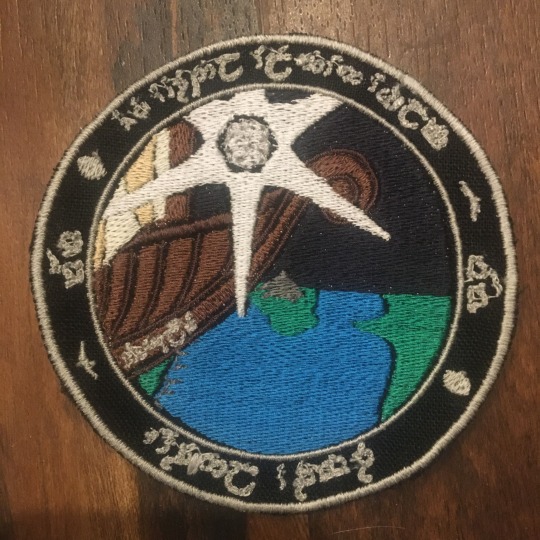
Mission patch for the launch of Gil-Estel! A bit messy, but a good place to start!
Design and linguistics details under the cut, because I put WAY too much thought into it and now must talk SOMEONE's ear off about it. Feel free to ignore this bit:
So, to start: Elvish NASA. I chose to call them Vardildi Elengolmo Vilciryamoyë, or VEV. The Followers of Varda, Astronomers and Astronauts. This could very much be totally wrong. Vardildi is Varda+the suffix used in Yavannildi, the followers of Yavanna. Elengolmo comes from the coined word for astronomer, Elengolmë (star-lore), with the -o suffix from nolmo, wise person. Vilciryamoyë takes the vil- from the root of vilya, meaning air, sky. ciryamo is mariner, and yë is the suffix added to the second word meaning 'and'. (I may be very, VERY wrong on this! If anyone has better ideas, I very much welcome input/guidance/constructive criticism)
So I stuck the tengwar for this on either side of the patch. (None of the tengwar is all that legible, though, I'm working on getting that sorted out) Most NASA mission patches don't actually have NASA on them, but I put it on anyway. Here is the tengwar and the start of a logo I made an attempt at (the tehta is supposed to be a shooting star, but that did NOT come through clearly in the embroidery [because it's tiny]):
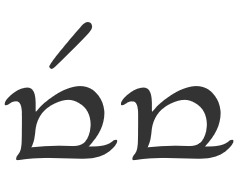

(Probably going to try to make an elvish NASA patch before too long, honestly)
Most NASA patches (from research I did with great self-restraint here) have the (last) names of the astronauts. Not sure if they also have the name of the craft or if that's generally somewhere else, but I put both--Eärendil Ardamírë (his fathername and mothername) are the tengwar at the bottom of the patch, and Vingilotë is written on the keel of the ship. None of these are legible because they are small, and my machine has limits. It's a work in progress. Also I apologize for the bad lighting in the photo.
NASA patches sometimes also have a mission motto. That's the tengwar across the top of the patch here-- aiya Eärendil elenion ancalima, Hail Eärendil, brightest of stars (a common cry among elves and Frodo [when facing Shelob]).
(I half wanted to do something a bit more funny--maybe something like 'Now I have become Venus,' or 'Do I get to come down?' but this was a bit easier since it comes pre-translated into Quenya and tengwar, and also I have no faith in my Quenya translations that are any longer than a word)
The horizon is flat because Númenor exists, in the middle there between the shore of Middle-Earth and a teensy bit of Valinor and the Enchanted Isles.
The design for the Silmaril is sort of taken from the heraldic device Tolkien designed for the Silmarilli (though it isn't clear), and it is rayed with the six-pointed star from Eärendil's device. (I stuck the moon phases from the same source around the edges as well)
This was really fun, even if it might be the silliest thing I've ever made! It definitely needs some workshopping--i don't mind the black lines framing some sections from the background fabric, but I might try turning all the tengwar into lines of stitches instead-the satin columns really are illegible.
I now need to restrain myself from doing some sort of NASA/Astronaut Earendil AU, because it now sounds kind of fun (I do not have the background knowledge for this)
Sources:
NASA patches here: https://www.shopnasa.com/collections/patches
Quenya translations here: https://www.elfdict.com/
Tengwar transcriptions here: https://www.tecendil.com/
And if you want info on the Europa Clipper mission, here: https://science.nasa.gov/mission/europa-clipper
Embroidery digitization done with Embrilliance Stitchartist 1, embroidery done with a Brother SE630 machine. Thread is Brothread Cotton and YLI cotton bobbin thread, with a little sulky rayon on the Silmaril. Cloth is a black linen from Fabric Wholesale Direct.
#earendil#silmarillion#space is cool#machine embroidery#pityahano#craft#surprisingly pleased with how this turned out#since it was less 'trace this colored pencil drawing by Tolkien'#and more 'what does a ship look like in 3000 stitches or less'#space#astronaut earendil#vev-elvish nasa#lord of the rings#silmaril
271 notes
·
View notes
Text
Writing Notes: Emotions

“Emotion” is a term that came into use in the English language in the 17th and 18th centuries as a translation of the French term “émotion” but did not designate “a category of mental states that might be systematically studied” until the mid-19th century (Dixon 2012: 338; see also Dixon 2003; Solomon 2008).
Many of the things we call emotions today have been the object of theoretical analysis since Ancient Greece, under a variety of language-specific labels such as passion, sentiment, affection, affect, disturbance, movement, perturbation, upheaval, or appetite.
This makes for a long and complicated history, which has progressively led to the development of a variety of shared insights about the nature and function of emotions, but no consensual definition of what emotions are, either in philosophy or in affective science.
3 Traditions in the Study of Emotions
Emotions as: Feelings, Evaluations, and Motivations
Although emotion theories differ on multiple dimensions, they can be usefully sorted into three broad traditions:
The Feeling Tradition - takes the way emotions feel to be their most essential characteristic, and defines emotions as distinctive conscious experiences.
The Evaluative Tradition - regards the way emotions construe the world as primary, and defines emotions as being (or involving) distinctive evaluations of the eliciting circumstances.
The Motivational Tradition - defines emotions as distinctive motivational states.
(Scarantino, 2016)
Each tradition faces the task of articulating a prescriptive definition of emotions that is theoretically fruitful and compatible at least to some degree with ordinary linguistic usage.
And although there are discipline-specific theoretical objectives, there also is a core set of explanatory challenges that tends to be shared across disciplines:
Differentiation: How are emotions different from one another, and from things that are not emotions?
Motivation: Do emotions motivate behavior, and if so, how?
Intentionality: Do emotions have object-directedness, and if so, can they be appropriate or inappropriate to their objects?
Phenomenology: Do emotions always involve subjective experiences, and if so of what kind?
Emotions as Constructions
Constructionists are convinced that emotions are put together on the fly and in flexible ways using building blocks that are not specific to emotions, roughly in the way cooked foods are constructed from ingredients that are not specific to them and could be used according to alternative recipes.
One of the ingredients out of which emotions are built is said to be core affect, which is a:
neurophysiological state that is consciously accessible as a simple, nonreflective feeling that is an integral blend of hedonic (pleasure–displeasure) and arousal (sleepy–activated) values. (Russell 2003: 147)
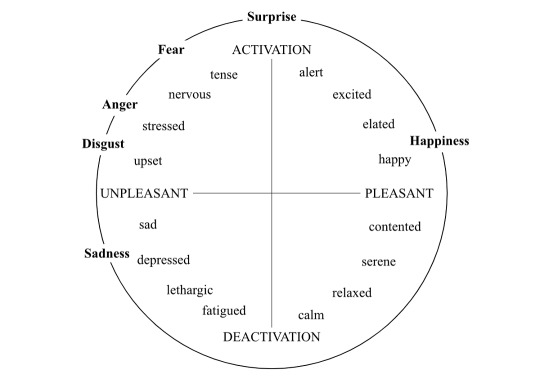
Psychological constructionists emphasize that we are always in some state of core affect, which is a sort of barometer that informs us of our “relationship��� to the flow of events.
The readings of the barometer are feelings, understood as blends of pleasure-displeasure and activation-deactivation.
These readings can be represented as points along a “circumplex structure”, with the vertical axis representing the degree of activation-deactivation and the horizontal axis representing the degree of pleasure-displeasure (Russell 1980).
Despite the great diversity of views on the nature and function of emotions, a broad consensus has emerged on a number of topics. Here is a tentative list of what a plurality of emotion theorists agree about, with brief mention of where the disagreements begin:
ONE. Emotion episodes involve, at least in prototypical cases, a set of evaluative, physiological, phenomenological, expressive, behavioral, and mental components that are diagnostic of emotions and are to some degree correlated with one another.
The degree to which these correlations are instantiated continues to be a central topic of theoretical debate: latent variable models assume that emotions cause the changes in components and expect to find strong correlations, whereas emergent variable models assume that emotions emerge from changes in components caused by something other than emotions and expect to find weak correlations.
TWO. Token episodes of the same folk emotion type (e.g., anger, fear, shame) manifest a great deal of variability with respect to expressive, behavioral, physiological and phenomenological features, as well as intensity, duration, valence, arousal, type and range of intentional objects.
Researchers disagree on whether underlying all this variability there exist measurable bodily patterns of some kind that are still distinctive of different emotions.
THREE. Emotions have intentionality or the ability to represent.
Researchers disagree on whether emotions represent descriptively or imperatively or both, on what exact contents they represent, and on what grounds the emotion-world representation relation. A small minority of researchers, hailing mostly from the enactivist movement, have argued that emotions lack representational qualities.
FOUR. The physical seat of emotions is the brain, but there are no neural circuits that correspond one-to-one with any folk emotion type, and brains are embodied and embedded in environments that are essential to their proper functioning.
Researchers disagree on how exactly the brain implements tokens of different emotion types, and whether emotional phenomena are best understood in terms of emotion-specific or emotion-unspecific neural mechanisms.
FIVE. Emotions typically involve conscious experiences, but such experiences are not strictly necessary for an emotion to be instantiated, in part because some emotion terms refer to dispositions and in part because most theorists consider feelings conceptually distinct from non-dispositional emotions.
A handful of influential researchers such as LeDoux (2017) and Barrett (2017) continue to identify emotions with conscious experiences.
SIX. Evolutionary and socio-cultural considerations must both contribute to our understanding of a great many emotions’ functions. These are both intra-personal functions —e.g., helping organisms coordinate organismic resources to deal with urgent demands—and interpersonal functions —e.g., communicating information useful for the negotiation of social transactions.
Researchers continue to debate whether there is sufficient empirical evidence for basic emotions and other special-purpose emotion mechanisms. Some see the role of evolution as limited to the shaping of general-purpose adaptations, such as core affect and the ability to categorize, which jointly lead to the emergence of emotions.
SEVEN. Emotions are no longer considered structurally opposed to reason.
Researchers continue to debate the circumstances in which emotions manifest various kinds of cognitive and strategic irrationality.
EIGHT. Emotions can be appropriate or inappropriate with respect to their intentional objects.
Researchers debate the grounds of, and distinctions between, different forms of appropriateness (e.g., fittingness, moral appropriateness).
NINE. Emotions typically involve appraisals of the significance of the stimulus situation, ranging between primitive and sophisticated forms of information processing.
Researchers debate what the structure of appraisals is, and whether appraisals cause or constitute emotions or both.
TEN. Emotions typically correlate with changes in motivation to do things.
Some researchers think emotions cause or consist in such changes in motivation, whereas others think that changes in motivation have other causes, or are too unspecific to ground a theory of what emotions are.
The exploration of these insights and the resolution of the disagreements around them is a thriving interdisciplinary project in contemporary emotion theory.
Philosophers and affective scientists will continue to engage in it for years to come, putting their distinctive theoretical skills at the service of projects of common interest.
Source ⚜ More: Writing Notes & References Word Lists: Uncommon Emotions ⚜ Other Words to Use ⚜ Positive Feelings
#emotions#writing reference#writeblr#langblr#psychology#spilled ink#writing prompt#poets on tumblr#character development#poetry#writers on tumblr#literature#words#linguistics#studyblr#dark academia#light academia#lit#fiction#novel#guillaume seignac#character building#writing resources
143 notes
·
View notes
Text


that OP imaginably intended it to mean something like this doesn't really overcome the fact that what they're calling a "4th person pronoun" 1. is not a pronoun (someone else pointed this out but, but to push the point further, see that "chatself" doesn't really check out here like "myself", "yourself", "itself", etc. does) and 2. also not really "4th person" in the way they're describing. i dont think its necessary to analyze it like this. in fact, it might be kind of incoherent? if you are talking to or at someone, you are speaking to them in the 2nd person, that's just the definition. if you are talking about someone and not to them, it's the 3rd person. what's happening in sentences like "chat, how are we feeling today?" or "this game sucks, chat" is that chat is 100% being spoken to and thus involved in the conversational situation. they are not "beyond" the conversation. they are being spoken to directly. so clearly these sentences have 2nd person references, but to capture what kind of behavior this is exactly, realize that "chat" is being used as a term of address. to quote the handbook of pragmatics:
Terms of address are the linguistic forms speakers use to refer to their collocutor(s), in the words of Oyetade (1995: 515) “words or expressions used to designate the person being talked to while talk is in progress”. In English, for example, these are words like you, mom, young man, or Professor Snyder.
"You are my best friend." "Mom, I'm home." "Go to your room, young man." "Professor Snyder, sorry I'm late." "I'm not doing that, chat." "You know what happened, my friends?"
608 notes
·
View notes
Text
Fiat Lingua Top 10 for 2024
It's time for the annual Fiat Lingua rewind!
Background: I created Fiat Lingua over ten years ago with the idea that it could be something like the Rutgers Optimality Archive: A place where conlangers could post work that they wanted to showcase, or work that was in progress. We've had tons of contributions over the years, and some standout work I'm really proud of.
Using our fancy statistics program (you know, the free version) we're able to determine the top 10 visited posts for this year (though, note, the numbers for the current year's December post will always be down a little bit, since it didn't have a full month. If you'd like to take a look at it, Carl Buck created a new workable orthography for Klingon from the original!). Here they are!
NUMBER 10
We have a tie...
"A Naming Language" (November, 2016) by Jeffrey Henning: A fantastic (and short!) essay about how to create a conlang sketch (or naming language) specifically aimed at authors. The author, Jeffrey Henning, was the most important person in conlanging from the 90s through the mid-2000s before his seminal website, Langmaker.com, died.
"Down with Morphemes: The Pitfalls of Concatenative Morphology" (March, 2014) by David J. Peterson: Honestly, I'm touched. And baffled. Why this paper, published ten years ago which hasn't touched the top ten the past two years, is suddenly on it is absolutely beyond me.
NUMBER 9
"Afrihili: An African Interlanguage" (April, 2014) by William S. Annis: Afrihili is an a posteriori auxlang from the late 60s that uses Bantu languages as its source. If you haven't read about it, you must. This article took sixth place the past two years, but this year dropped to ninth!
NUMBER 8
"Tone for Conlangers: A Basic Introduction" (April, 2018) by Aidan Aannestad: This is the third time this article has been in the top 10, but it slipped one place to number 8. Conlangers continue to find this introduction to tone quite valuable.
NUMBER 7
"Names Aren’t Neutral: David J. Peterson on Creating a Fantasy Language" (March, 2019) by David J. Peterson: Down two spots from last year, this is my article on best practices when coming up with names in a fantasy setting—even when no conlang is present.
NUMBER 6
"Introduction, A Note on the Terminology and Linguistic Methodology of This Paper, and Section I" (February, 2012) by Madeline Palmer: So...this came out of nowhere. This was an early series that helped me avoid having to do a bunch of work for Fiat Lingua in the early years. I was grateful for the runway! I have no idea why, after more than ten years, the dragon language Srínawésin is now getting attention after getting next to none in the past, but…it's getting attention—in a big way. Anyone know why?
NUMBER 5
"Patterns of Allophony" (April, 2015) by William S. Annis: Definitely one of the most popular papers on Fiat Lingua, William illustrates graphically a number of very common sound changes. This article has been at #3 the past two years but tumbled two spots this year to #5.
NUMBER 4
"Hieroglyphs of Fneise" (April, 2024) by Jason Lynn: New to Fiat Lingua this year and new to the top ten, everyone loved this new article about the hieroglyphs of Fneise, created by Jason Lynn, friend of LangTime Studio!
NUMBER 3
"A Conlang-Venture: A Select-A-Feature Adventure" (January, 2024) by Jessie Peterson: This MAMMOTH .pdf is honestly one of the greatest conlang achievements ever. Clocking in at over 700 pages, Jessie created a hyperlinked choose-your-own-adventure demonstration of how to evolve a naturalistic conlang. This document is nothing short of amazing.
NUMBER 2
"Grambank & Language Documentation: Zhwadi and Its Features" (June, 2023) by Jessie Peterson: Even her massive conlang-venture .pdf couldn't top her incredible resource from last year. This is a short description of how to use Grambank in conlanging with a link to a fillable Google spreadsheet any conlanger can copy and use to introduce their conlang to others. Last year this made #4 on the list, and this year it jumped two spots!
And now for the top viewed article for 2024 on Fiat Lingua...
NUMBER 1
"A Conlanger's Thesaurus" (September, 2014) by William S. Annis: The king is back! Last year my article on how to create a surreal conlang took the top spot. This year? Not even in the top THIRTY! It's like it was wiped off the face of the internet! Whether it's top spot or not, though, William Annis's resource on how to create unique words with unique interrelationships and associations has proved useful to conlangers of all stripes. As a reference work, it is unparalleled in terms of usefulness modulo brevity.
* * * * *
And that's it for 2024! I'm looking forward to posting more conlang articles next year. If you are a conlanger, a conlang-researcher, or conlang fan who has something to say in .pdf format about a specific conlang or conlanging in general, please consider submitting something to Fiat Lingua! We take any and all articles related to conlanging in whatever form you have them. I'm also happy to help you think up ideas, or refine those ideas you have. There is no strong review like in a fancy journal: I just want to get what you have up. I'm especially in interested in hosting personal conlang stories—stories about how or why you started to create a language, or your experience creating your own language—personal stories that are often lost, but are so vital, as there is an absolute dearth of literature about conlangers! If you think you have even the seed of an idea, please get a hold of me! I want to share as many stories and ideas as I can.
#conlang#fiat lingua#jessie peterson#william annis#william s annis#jason lynn#fneise#afrihili#grambank#linguistics#language#lcs#madeline palmer#aidan aannestad#language creation#srínawésin#jeffrey henning#language invention#carl buck#klingon
92 notes
·
View notes
Text
Elvish For Dummies
Pairing: Legolas x Reader (gender neutral)
Summary: Set after the events of LoTR. You live with Legolas in Mirkwood and he teaches you Elvish. Pure fluff.
Word Count: 1039
Notes: Established relationship, reader is human, tried to make the sindarin elvish as accurate as possible so apologies for any mistakes, I’m multilingual so I based this off of my own experience with learning languages��
Read it on AO3 here
Story:
Despite the fellowship having disbanded, each day with Legolas seemed like another adventure. During your perilous journey together, the two of you had grown closer than either of you thought possible. The mere thought of being apart from you pulled at his heartstrings. He could not bear the thought of being separated from his new love. After the one ring was destroyed, the elf invited you to come with him to Mirkwood. Hastily, you agreed, for you too could not wait to start a new life with the elven prince.
Since reaching Mirkwood, many seasons have passed and you two grow closer by the day. Under his guidance, your archery skills and ability to speak Elvish have improved. He took it upon himself to privately tutor you in the tongue of his people. Legolas still giggles when you fumble certain words on your tongue, but is quick to apologize, never wanting to discourage you. He says you have made remarkable progress and that you possess great linguistic potential. Whether that is true or he is exaggerating with sugar coated words, you cannot tell but it feels good to hear his encouragement either way.
Most of your days together included walks through the woods and riding horseback, but today was a gloomy rainy day. A day that, Legolas decided, would be a wonderful excuse to help you get back to your studies. It’s not that you did not enjoy Elvish. Oh no! You quite liked hearing him whisper loving words to you as he held your gaze.
“Meleth nîn, Im tur feel cín emel dring dan sab - My love, I can feel your heartbeat against mine”, he would say as he held you in his arms, his breath dancing upon your skin with each syllable.
Saying you enjoyed that would be the understatement of the century. Everything in Sindarin sounded like poetry. Even the most mundane sentences were said with purpose and flowered language. Unfortunately for you, that also meant the most basic phrases you had to learn weren’t your typical ones. Instead of “I went to the store”, you had to say “I depart to look for food - Im gwann- na thír an aes”. It seems that most Elvish children learn how to say things like “I can feel it in the earth - Im tur- feel ha in i coe” before they learn “please” and “thank you”. No wonder they all sound prophetic when they speak common. Creepy oracle sounding sentence structure as your first language combined with being thousands of years old will do that.
“Meleth nîn, you’re drifting off. Shall we return to our lesson or is a break needed?”, Legolas' words break you out of your trance. You look up from your desk, covered in notes, to see him towering above you, eyebrow raised and arms crossed.
“Apologies, I was merely pondering the linguistic differences between Sindarin and Quenya Elvish”, you quickly come up with the excuse to hide the fact that you were simply not paying attention.
“Is that so?”,
“Yes, yes, the distinction between Elvish languages is very interesting to me”.
“This is the third time this lesson you’ve been distracted by those differences”.
“Ah, well…”, you trail off, caught red-handed.
“Y/N, I will not force you to learn Sindarin if you do not wish it”.
“No, no, no, I want to learn. I promise. It’s all just new to me and takes a moment to sink in. Please, repeat what you said. I’m paying attention”.
Legolas smiles but does not repeat himself. Instead, he moves on to an exercise he is sure will get your attention.
“We shall review what I have taught you thus far.”
…
“ Very good, Y/N. Now how would you say ‘the stars shine white’?”
“ I elena mír thilivern”
“The grass is green?”
“I thár na- calen”
“Very good pronunciation. You have done well. I believe it is time to learn some new vocabulary”.
You take out a new sheet of paper from your stack, ready to write.
“You need not write for this portion. Repeat after me.”
“Okay”. You put your quill down.
“Meleth nîn.”
“Meleth nîn. I know what that means already. You say it all the time”.
“And what does it mean?”
“My love”, your lips turn upward in a shy smile.
“Very good. Let us move on then”, he smiles brightly, as if pleasantly surprised despite knowingly fully well that you knew its meaning.
“I’m ready. Hit me.”
He suddenly sits down next to you and takes your hands into his own.
“Im mel cin”
“Im mel cin”
“Do you know its meaning?”
“No, should I? I’m sorry.”, your eyes widen as you try to recall whether he had said it before in a previous lesson.
Legolas throws his head back with laughter. This may be the hardest you’ve ever seen him laugh before… and it’s at you. Great.
“Apologies. Apologies.”, he manages to get out between giggles, “The look on your face was priceless.” Your face sours at this and Legolas manages to resist a second burst of laughter from it. He thinks you equal parts hilarious and adorable.
“You would not have known this phrase as I have never spoken it to you before. I do think it is high time for you to learn it”.
“Okay, so what does it mean?”, you scrunch your eyebrows together, ego still a little hurt from being laughed at.
His grip on your hands tighten but his touch stays gentle as ever. He has always been gentle with you. His gaze holds the same softness. No, even deeper. The blue of his eyes seem more vibrant and invite you in to look deeper within him. His eyes tell of a love that can never be truly explained in any language. Legolas has always had a staring problem when it comes to you, but this is something different entirely. Your cheeks redden at his seriousness.
“I love you”.
Your eyes widen once more and before you can react, he kisses you. Deeply. Passionately.
“I love you. I love you. I love you.” he repeats again and again into your lips.
…
Maybe learning a new language isn’t so bad, if you have the right teacher.
#legolas/reader#legolas x reader#lotr#legolas greenleaf#legolas#lord of the rings#legolas x yn#lotr x reader#legolas x y/n
329 notes
·
View notes
Text
right, i had eight followers before that imperialism post, and i’m now at almost 200, so i should do an introduction since most of you don’t know me in real life anymore.
i am:
• pākehā and proudly tangata tiriti
• a transsexual woman
• a polyamorous asexual lesbian
• physically disabled and chronically ill
• autistic, adhd, and more
• a non-denominational leftist, although i most closely align with socialist ideals
i believe strongly that:
• trans women are women and should universally be treated as such, without exception
• what is good for māori is good for all of us in aotearoa, and tino rangatiratanga and self- and co-governance are equally or more important for our nation than the imported british parliamentary system
• minorities of any form cannot achieve liberation solely through the power of the state, and a strong intra- and inter-community allyship in our shared struggles is the best way to achieve this
• minorities do not owe the majority politeness or patience, and tone policing is a subtle but real form of violence
• sex work is work in all of its forms and should be universally decriminalised, and legislative and health protections should exist for people in that industry without regulation or restriction
• disabled people should be allowed to exist in society and be valued, even if they do not or cannot contribute to a capitalist system
i believe that the internet should not be a numbers game, and if you disagree with my values then i don’t want you in my space. i make no room for racism, sexism, misogyny, transphobia, transmisogyny, ableism, sanism, intersexism, gender binarism, homophobia, or any other form of discrimination against a minority group. i believe that “infighting” in the queer community is most often used to shut down the conversations held by and for more vulnerable intersectional groups such as trans women, queer people of colour, or disabled queer people.
i have a lot of strong and long-lasting special interests, which i post and reblog about frequently. these include but are not limited to:
• linguistics, which i am currently pursuing a bachelor’s degree in. i focus mostly on syntax and morphology, queer sociolinguistics, and conlanging. i speak the constructed language toki pona with near-fluency.
• spaceflight, astrophysics and rocketry (it should go without saying that elon musk is a shitcunt and a stain on this scientific field, and that militarism in spaceflight inhibits the progress of human knowledge)
• worldbuilding and conlanging, without preference for genre, but most frequently for ttrpg purposes.
my asks and dms are generally open, although i do not owe anyone a response. i treat my online space like my real spaces; if i would not maintain a friendship or conversation with you in person, do not expect me to do so online.
i didn’t really want to be viral or known here, and it’s a truly strange experience being posted about by other people because of that post. i fully intend to resume my normal posting and reblogging about my interests and the causes i care about from here on, as i have no intent on changing my tone or style because of this.
25 notes
·
View notes
Text
Progress on the Dungeon Meshi cultural and linguistic analysis essay...
We're at 112 pages lads. Here's the chapter titles. The organization and flow is finally starting to really congeal...
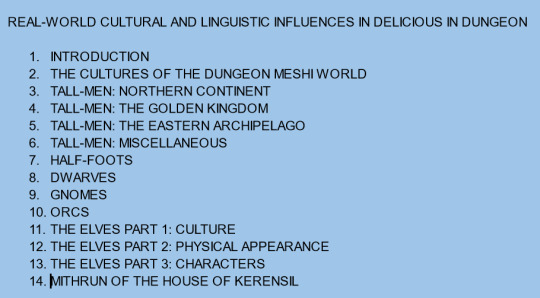
(Yes, the elves have 3 damn chapters. Yes, Mithrun has his own chapter lmao)
151 notes
·
View notes
Text
A Linguistic Analysis of the Spelling Names "Ania" and "Anya" (and the chapter and languages of Ostania)
This includes spoilers from Short Mission 11, or Chapter 90.1
It's not a secret that Anya's (Ania) name change was officialized along with Loid (Lloyd) and Yor (Yoru/Yolanda) in July 2019. I do recall that our loveable Forger family had different spellings in the early manga releases. Many believed that it was Endo-san's way to cover up the spelling mistake, but I believe that, whether or not the origin and/or intention was a mistake, it paved a beautiful opportunity for a deep dive into linguistics and character analysis on Anya Forger.
First, I'd like to address my thoughts on "ANIA" as the spelling. Here are a few of my impressions on this:
"ANIA" could be perceived as her original spelling because wherever she came from used this spelling.
"ANIA" could just be her limitation as a child when it came to spelling her name.
"ANIA" could be an acronym from her lab that probably served the purpose of her existence.
"ANIA" could be the name of her mother/creator. And she was subjected to share the same name of her creator for "sourcing" purposes.
"ANIA" when applied to numerology number, reinforced her code name which is 007 (which is super meta to me, but probably is a coincidence because we all know 007 was Endo's way of referencing James Bond). S/O to @momentocollector for sharing this!

Second, I'd like to address "ANIA" as an identity for our precious baby girl.
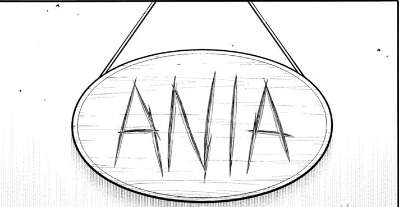
"Ania" is the chosen spelling. This could possibly mean that this is her real name and how it should be spelled (You, as the owner of your name have every right to decide what your name should be, spelled, or pronounced after all).
"Ania" could possibly be an influence of either her mother-tongue language's spelling.
"Ania" could possibly be due to her limitation of spelling. (I don't think she is aware of how her name should be spelled.)
Recall that Yor carved out Anya's name as "Ania" and didn't question it. This could be a reflection of Yor's own lack of familiarity of Ostanian orthography since she is academically limited, and she would have listened to how Anya would have wanted her name to be spelled. Furthermore, this tells me that Yor's absence of questioning reflects that she accepts her daughter no matter who she is, be it "Ania" or "Anya".
Third, I'd like to address "ANYA" as her name's spelling.
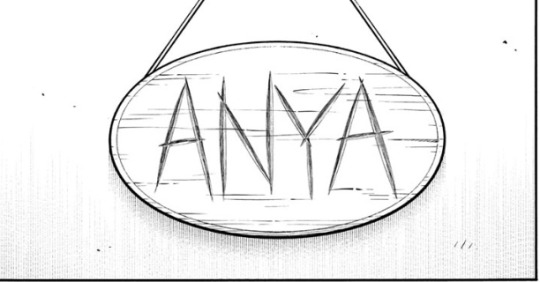
"A-N-Y-A" is the spelling that her papa gave her, which tells her that she can now be on the same playing field as her parents. Their names and titles are all "masks" in this masquerade that they call "Forger". So, to little Anya, it means that she finally belongs with someone. Anya has essentially found "her home".
We also know that Franky did do a lot of paperwork and found that "Anya" is the spelling that was written down on her adoption papers. This reinforces that "Anya" is the standard Ostanian orthography of her name.
I perceive Loid as a person replicating the "average Ostanian" (since this is a deep cover mission after all), so to also tell her that her name is spelled a certain way reinforces that she has a new identity as an "Ostanian child". (I find this quite ironically poetic because it's a "fake man" giving a "fake name" to his "fake daughter").
I also see that when Anya's eyes light up, it could also mean that this new identity in her spelling change meant she was finally liberated from her days as a lab experiment and living in an orphanage.
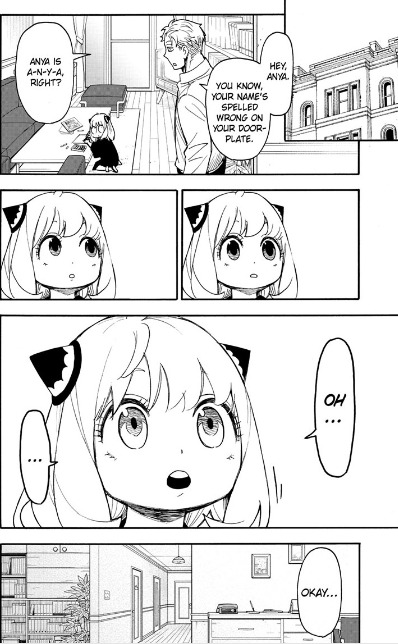
Fourth, I'd like to address spelling etymology.
Since I'm not a Japanese linguist expert, I found @connoisseursdecomfort post to be quite educational when it came to Japanese spelling.
What we learn from the above post is that "Ania" is an acceptable name spelling in "Old Japanese". But as time progressed, the spelling changed to "Anya" which is the modern-day spelling of this name (this may tie into Anya's character lore).
We can track "i" becomes "y" in the evolution of the alphabet from Phoenician (c. 1000 BC) to Archaeic Greek (c. 750 BC). S/O to @rachellysebrook for this link. (Again, what this reinforces is Anya's background with an unidentified mother country/mother tongue language).
Another thing is that Yor Forger did not react to the spelling of "Ania". It could possibly be that she recognized Anya's limitation, given that her daughter already had poor scores since her admission.
We also learned that Yor, a real Ostanian, seems to be limited with Ostanian orthography which is most likely due to her dropping out of school to take care of Yuri (fake Ostanian /j). From her interaction with Anya, off-screen, it appears that Yor seems indifferent to spelling standards of names (Which is nice! She is subtly against society's norm and I love her for that). Had she been aware of the spelling, she would have been the one to ask instead of Loid. (But again, it must be Loid because it's poetic and has a much more meaningful interaction between "Loid" and "Anya").
Fifth, I'd like to address the name's (possible) impact on character purpose in the story.
"Anya" means mother in Hungarian (S/O to @httplovecraft1890. This inspired my thoughts on "Ania" as a name in the lab). Could this possibly be an inspiration or coincidence? It could be a stretch, but perhaps Anya's purpose in the lab is that she's a "mother weapon" for war.
"Ania" means "gracious" and "merciful" according to Google. Which makes me think that the lab scientists went with this name because it would represent her purpose as a weapon of war. Perhaps Ania becomes the "truth serum" and could be seen as the "angel of death" because she knows the war captor's thoughts and inevitably they are executed (a possible headcanon).
Sixth, I'd like to discuss the factors of the mysterious "unidentified language".
Anya did use "oui" in the anime when Loid had adopted her. This automatically made me think her possible origins could be French, but it could also take another step back in the language family: Romance. What makes this work is that we treat "Classical Language" as a dead language based on what we read/saw in the manga/anime like Latin. Anya has an innate potential to be bi-/multilingual.

Bonus: Seventh, I'd like to talk about the languages in this anime (This is a bit of a ramble but since we're talking about linguistics, I thought why not)...
Based on the dialogues spoken in the anime, we can confirm that English exclamatory (Oh my God, Goddammit, Shit, Wow, Elegant, etc.) and the Japanese language are the main components of the Ostanian language. This is reinforced by many characters who have used English expressions (Loid, Yuri, Yor, Anya, Damian, Henderson, etc.)

What does bug me is whether or not "oui", a French exclamatory, should be categorized as part of the Ostanian language or if that should be categorized for Anya's hidden lore. The reason is that when Loid/Twilight heard Anya say "oui" in front of him, he did not question it. (Perhaps he was too tired to process this, or he excused it as something Anya could have seen on TV and is merely mimicking. I really don't think Twilight would be the type to excuse this realization had he not had the aforementioned state of mind). I'm leaning more towards the latter as this is from Anya's mother tongue language.
In conclusion (or tldr;): "Ania" may be her real name, but "Anya" is her new identity as part of the Forgers.
If you read everything, thank you for your time! The linguist in me is so happy that Endo-san is steeping his foot into linguistic territory. As short as this chapter was, it said A LOT to me linguistically and provided more details to the scraps of lore that we know of Anya but it also tells us a bit more about Yor, Loid/Twilight, and Ostania.
#spy x family#spy x family spoiler#spy x family chapter 90.1#Anya Forger#Ania#Anya#name analysis#manga chapter analysis#analysis#Spy x family Analysis#linguistics#orthography#loid forger#yor forger#scarlymadeathing#scarlydidathing#scarlywroteathing
308 notes
·
View notes
Text
Ok I need someone smarter than me to be meta about why John changed Gideon’s name in the way he did. Not that he changed it at all, that one I can understand from his perspective, but specifically why he changed it to something with clear gender markers.
Gideon Nav is perfectly neutral bordering on traditionally masculine, but KirionA gaiA is clearly female. Gaia is literally the feminized version of Gaius according to Latin grammar. In a society of John’s own creation that is apparently past most of our current gender and sexuality norms, how and why would he choose that? Is this another way to show that he’s not as progressive as he thinks he is? Is it about him actually not understanding Gideon at all and forcing her into a weird box? Is there some kind of cultural or linguistic aspect I’m not seeing here? Is it nothing and I’m overthinking? What is going on?
#the locked tomb#tlt#john gaius#Gideon nav#kiriona gaia#Nona the ninth#tlt meta#emperor john gaius#we should totally just stab Caesar (Jod)#anyway someone please give your thoughts I cannot figure this out#k thankssss!!
254 notes
·
View notes
Text
Bored and yearning. Here's some Arcade x transmasc headcanons
- Will gladly help you with T shots or T gel. He's always very careful about it every time he helps out
- Reminds you (if pre-op/no-op and binding) to take breaks from wearing your binder and gives you back massages if your back hurts from it
- If post-op and had just gotten top surgery, he'd do basically everything for you. Getting you food, reaching things for you, letting you rest in bed, and even helping you change your bandages. Every time he has to leave your side for something he gives you a quick kiss on the forehead
- If strictly no-op, he'd assure you he's still very attracted to you whether you get surgery or not. He'd probably even be a little envious of you for being more comfortable as yourself than he is, but it never makes him bitter. If anything he admires you
- If post-op and healed, he'd love to lay with you and trace over your scars with his hands. He finds it hot and thinks it makes you more "rugged"
- Thinks you're very awesome just for existing despite troubles you might face. You inspire him to slowly take better care of himself for you
- Constantly researching more efficient ways to medically transition, excitedly tells you about any breakthroughs he makes even if they're small
- Willing to defend you with his LIFE. Will chew out transphobes with both scientific backing and insult them at the same time, also willing to deck someone in the face if they get too ballsy around you (he always acts embarrassed afterwards though. He doesn't like violence but loves you enough to resort to it if needed)
- Learns about transgender/queer history both in pre-war and post-war times and tells you anything about it he thinks you'd find interesting
- Lets you wear his clothes if yours are dirty or damaged. Sometimes even excitedly insists on it because he loves how you look in his clothes
- Lets you use his razor if you need to shave and don't have one. He makes sure to sanitize it after use so you don't have to worry about shared germs
- Writes your new name down on his hand if you pick a new one. Very intent on memorizing it as best he can
- If you use xenopronouns/neopronouns, he loves hearing about it because he thinks it's a fascinating use of linguistics
- Just genuinely thinks you're the coolest guy ever. He'd be happy to have you around and gets depressed when you're away. Probably even talks about you a lot
- Excited at any progress in your transition. Whether it's physical changes or simply seeing you happy to be yourself, it makes him overjoyed to see you happy
#thats all for now. obv not all of these apply to every trans guy but im hoping its varied enough#also i hope it doesnt sound like im picturing him as a chaser 😭 just jotting down things id like from my perspective#vinny rambles#fallout new vegas#arcade gannon#arcade gannon x reader
79 notes
·
View notes
Text
Sayeth others what they will, I am really enjoying the show. Santiago's face at Pelayo's betrayal is a poem. So was Marta's trying to deny the allegations. Santiago: She's an invert
Marta: Excuse this poor, uneducated man. The linguistic complexities of the Thesaurus Dex are lost on him. What he means is Introvert.
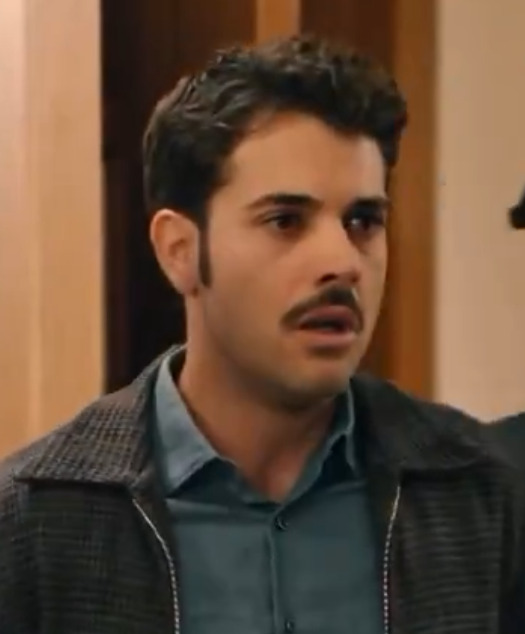

All in all I'm glad Santiago's demise happens the way it does. Karmic justice prevailed in a way that stings worse for him, I think. He bit off more than he could chew, filled with self-importance and secure in his triumph over Marta. Having counted on Pelayo to back him up only to discover he's free-falling, no safety net in sight? Oh, how the turns have tabled, as @midniteowlet loves to say. Could be we have not seen the last of him, though. Alas, mediocre men? Ever their cup overfloweth with confidence. Santiago vowing vengeance even as he's being dragged away by the Civil Guard? Someone failed to understand the assignment, or asses the situation. Damian reaching out to hold Marta's hand as a vow of support and loyalty? Be still my heart, they've come SO far. In my humble opinion, the growth of their relationship has been one of the best written character arcs on the show. Marta & Damian: Dairy? What dairy? He's obviously trying to milk this lie for all it's worth
Santiago: Diary ... D I A R Y
Pelayo: someone take him out to pasture … the inmates work at the dairy farm, across town



As for Pelayo himself. So far, a pleasant surprise, albeit he largely remains an unknown. He signs the business deal without making a fuss. He returns Marta's diary to her, tells her he's not read it and advises her to get rid of it, informs her his reasons for helping her are his own and that he won't ask for favors, especially given men don't count among her tastes? Well. He's been a gentleman so far, noble and altruistic. Remains to be seen if he remains one. It would seem, tomorrow's preview corroborates the theory that Pelayo flies the Rainbow flag too. His 'I prefer to form my own opinions about people ... especially people like the both of us who don't fit the social mores' ... it appears he's confessing something personal to Marta, something that might level out the playing field between them. To me it looks like he's out to gain her trust. For what purpose? Now that's the question.


If he's to become this show's Harry Cameron? I'm not opposed. Marta needs more allies and here's to hoping, as the show progresses, these two end up having a beautiful friendship. It really would be Marta hitting the jackpot in 1958: a sympathetic husband / best friend who ended up accepting her for who she was and a gay business partner / friend. Let's see where it all goes. Presently, he’s definitely trying to curry favour with Marta. For what reason, has yet to be determined. I will say? I am not liking Carmen at all these days. She acts like Tasio's mom, not his wife, as if he were incapable of making his own decisions. She's judging Marta as if she were a stranger and removes any and all accountability from Tasio. I keep repeating myself, but one questionable decision does not a questionable person make. Carmen being such a hot-head about this, while befitting her volcanic personality, is rather disappointing. I know she'll reconsider, but to think Marta is trying to buy Tasio's silence by ceding part of her shares in the company is ludicrous. Marta has always appreciated and supported Carmen within the company, and Carmen has had a front-row seat in witnessing Marta's fairness and kindness, her struggles and triumphs. I really need Fina to talk some sense into her. Volcano vs. Volcano. That ought to be a sight. Might I also hope Marta gives Fina the diary to read before she disposes of it? That they have a heartwarming conversation about it, growing even closer in their love, taking their intimacy to new heights? Because dispose of it she will, I think: sadly, it’s a smoking gun they can't afford.
Short rant long? Alright novelita. Lead the way. Let’s see what else you’ve got in store.
46 notes
·
View notes
Text
Ok so. I am writing and illustrating a novel called ‘Ynys Arawyn’.
It is structured as such:
Prose Chapter | Riddle | Poetry Chapter | Prose Chapter, repeat. It has illustrations throughout and I’m aiming for a medieval book of hours type thing.
It contains fictional fantasy retellings of the history of Merthyr Tydfil and the Ironmasters, the brutal history of Abergavenny Castle, and many more tales sown into the heart of South Wales. It takes inspiration from the works of Shakespeare (in dialect), Tolkien (in vibe) and Welsh History and Mythology.
There are soliloquys, LGBT+ themes, nurturing nature, brutal betrayals, a fight between two magic wielding brothers, sieges, battles of wits, giantess warrior witches, dragons, magical conduits, elves (Tylwyth Teg), fallen stars, werewolves (cwn annwn and Y Helais-Wyllt), ghouls (wrach’ribn), and half-spider monstrosities.
Beware ye, all who enter - here be monsters. Monsters, and men. But which is which? What makes a monster a monster? Can a man become a monster become a man?
It is deeply druidic, wholeheartedly Cymraeg, and very very queer.
Chapter titles are in Welsh, although I am also playing with linguistics to create my own language.
The language of the Coronids - stars, created by and sparkling like dew in the web of the Void Spider Coronach - is written in the round, like the manucript for ‘En La Maison Dedalus’, punctuated with long sweeping lines connecting the phrases, resulting in writing that spirals and connects like a spider’s web. The language itself is a mixture of Gaulish, Cymraeg and Kernowek (I lived in Cornwall for a while), and the language that the elves use is derived from this - given that they studied the stars from the mountaintops - and is pretty much just a more phonetic Cymraeg, and written in linear lines. There are hardly any speakers of the language, since it is mostly used for incantations and spells, and not many elves in the modern day were taught to wield the power of the mountains. But the language is reviving itself.
So far, I’ve written many poems, a couple of chapters and a collection of riddles, some in English and one in my Tylwyth Language (with a translation). I’ve drawn a rough map. I’ve designed the spiralling format of the original Coronid scripture. It’s starting to come together.
I’ve not marketed it yet, nor have I disclosed any of it up until now, as it’s still a work in progress, but if you love the following, I’m confident you’ll enjoy it!
🍎 LGBT themes - main characters!!
🍎 D&D, BG3, The Witcher, Dragon Age
🍎 Tolkien
🍎 Welsh Mythology and Folklore
🍎 Dark, Gritty but Beautiful Fantasy
🍎 Shakespeare
🍎 Linguistics, particularly for ancient languages
🍎 Welsh History
🍎 Enemies to Lovers
🍎 Strong female characters who aren’t “girlbosses”.
🍎 Sad old men
🍎 Lady Knights, Celestial Femboys and Transmasc Monsters, Oh My!
🍎 Riverdance
If it was ever made into a film or series, I’d want this as the theme tune!!!
I’m also looking to get it translated and published in Welsh. Ideally, I’m hoping to work with Y Lolfa. My dream is to make it to the Hay Festival and the National Eisteddfod, where I someday hope to compete as a Bard.
A sample of my art:

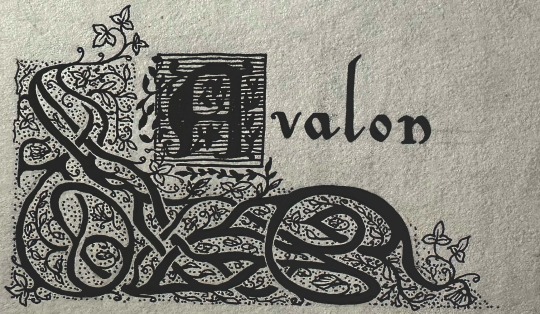

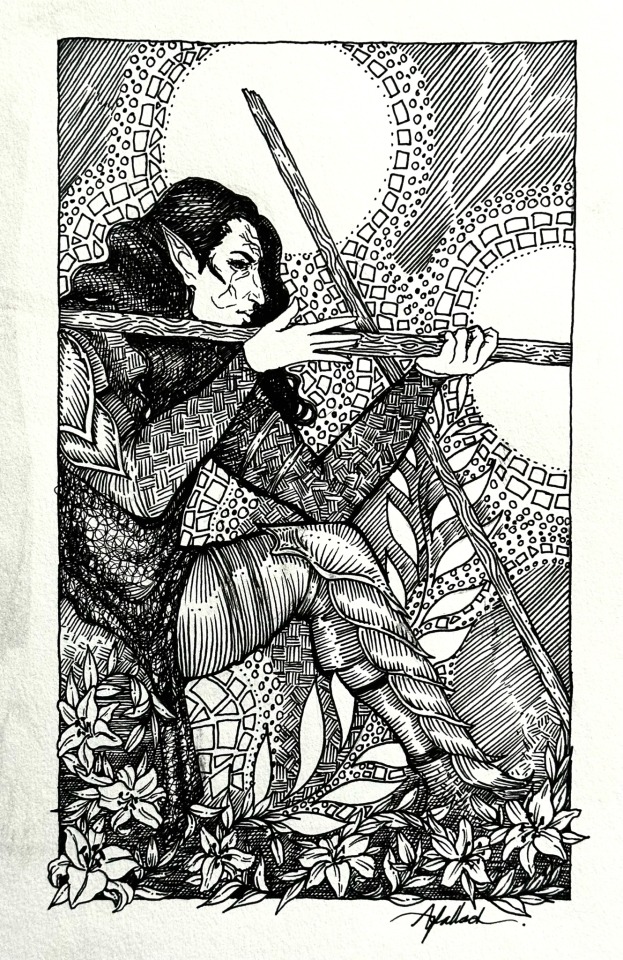
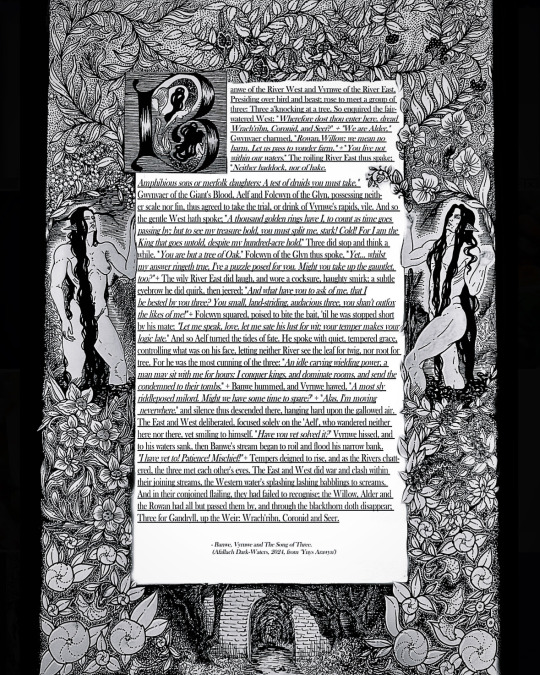
#silmarillion#silm#the silm#the silmarillion#lotr#welsh druid#welsh culture#welsh folklore#welsh mythology#lgbtq community#lgbt pride#lgbtq#lgbtqia#lgbtq positivity#fantasy writer#fantasy#fantasy writers#writers on tumblr#writing#SoundCloud
13 notes
·
View notes
Text
"Open" "AI" isn’t

Tomorrow (19 Aug), I'm appearing at the San Diego Union-Tribune Festival of Books. I'm on a 2:30PM panel called "Return From Retirement," followed by a signing:
https://www.sandiegouniontribune.com/festivalofbooks

The crybabies who freak out about The Communist Manifesto appearing on university curriculum clearly never read it – chapter one is basically a long hymn to capitalism's flexibility and inventiveness, its ability to change form and adapt itself to everything the world throws at it and come out on top:
https://www.marxists.org/archive/marx/works/1848/communist-manifesto/ch01.htm#007
Today, leftists signal this protean capacity of capital with the -washing suffix: greenwashing, genderwashing, queerwashing, wokewashing – all the ways capital cloaks itself in liberatory, progressive values, while still serving as a force for extraction, exploitation, and political corruption.
A smart capitalist is someone who, sensing the outrage at a world run by 150 old white guys in boardrooms, proposes replacing half of them with women, queers, and people of color. This is a superficial maneuver, sure, but it's an incredibly effective one.
In "Open (For Business): Big Tech, Concentrated Power, and the Political Economy of Open AI," a new working paper, Meredith Whittaker, David Gray Widder and Sarah B Myers document a new kind of -washing: openwashing:
https://papers.ssrn.com/sol3/papers.cfm?abstract_id=4543807
Openwashing is the trick that large "AI" companies use to evade regulation and neutralizing critics, by casting themselves as forces of ethical capitalism, committed to the virtue of openness. No one should be surprised to learn that the products of the "open" wing of an industry whose products are neither "artificial," nor "intelligent," are also not "open." Every word AI huxters say is a lie; including "and," and "the."
So what work does the "open" in "open AI" do? "Open" here is supposed to invoke the "open" in "open source," a movement that emphasizes a software development methodology that promotes code transparency, reusability and extensibility, which are three important virtues.
But "open source" itself is an offshoot of a more foundational movement, the Free Software movement, whose goal is to promote freedom, and whose method is openness. The point of software freedom was technological self-determination, the right of technology users to decide not just what their technology does, but who it does it to and who it does it for:
https://locusmag.com/2022/01/cory-doctorow-science-fiction-is-a-luddite-literature/
The open source split from free software was ostensibly driven by the need to reassure investors and businesspeople so they would join the movement. The "free" in free software is (deliberately) ambiguous, a bit of wordplay that sometimes misleads people into thinking it means "Free as in Beer" when really it means "Free as in Speech" (in Romance languages, these distinctions are captured by translating "free" as "libre" rather than "gratis").
The idea behind open source was to rebrand free software in a less ambiguous – and more instrumental – package that stressed cost-savings and software quality, as well as "ecosystem benefits" from a co-operative form of development that recruited tinkerers, independents, and rivals to contribute to a robust infrastructural commons.
But "open" doesn't merely resolve the linguistic ambiguity of libre vs gratis – it does so by removing the "liberty" from "libre," the "freedom" from "free." "Open" changes the pole-star that movement participants follow as they set their course. Rather than asking "Which course of action makes us more free?" they ask, "Which course of action makes our software better?"
Thus, by dribs and drabs, the freedom leeches out of openness. Today's tech giants have mobilized "open" to create a two-tier system: the largest tech firms enjoy broad freedom themselves – they alone get to decide how their software stack is configured. But for all of us who rely on that (increasingly unavoidable) software stack, all we have is "open": the ability to peer inside that software and see how it works, and perhaps suggest improvements to it:
https://www.youtube.com/watch?v=vBknF2yUZZ8
In the Big Tech internet, it's freedom for them, openness for us. "Openness" – transparency, reusability and extensibility – is valuable, but it shouldn't be mistaken for technological self-determination. As the tech sector becomes ever-more concentrated, the limits of openness become more apparent.
But even by those standards, the openness of "open AI" is thin gruel indeed (that goes triple for the company that calls itself "OpenAI," which is a particularly egregious openwasher).
The paper's authors start by suggesting that the "open" in "open AI" is meant to imply that an "open AI" can be scratch-built by competitors (or even hobbyists), but that this isn't true. Not only is the material that "open AI" companies publish insufficient for reproducing their products, even if those gaps were plugged, the resource burden required to do so is so intense that only the largest companies could do so.
Beyond this, the "open" parts of "open AI" are insufficient for achieving the other claimed benefits of "open AI": they don't promote auditing, or safety, or competition. Indeed, they often cut against these goals.
"Open AI" is a wordgame that exploits the malleability of "open," but also the ambiguity of the term "AI": "a grab bag of approaches, not… a technical term of art, but more … marketing and a signifier of aspirations." Hitching this vague term to "open" creates all kinds of bait-and-switch opportunities.
That's how you get Meta claiming that LLaMa2 is "open source," despite being licensed in a way that is absolutely incompatible with any widely accepted definition of the term:
https://blog.opensource.org/metas-llama-2-license-is-not-open-source/
LLaMa-2 is a particularly egregious openwashing example, but there are plenty of other ways that "open" is misleadingly applied to AI: sometimes it means you can see the source code, sometimes that you can see the training data, and sometimes that you can tune a model, all to different degrees, alone and in combination.
But even the most "open" systems can't be independently replicated, due to raw computing requirements. This isn't the fault of the AI industry – the computational intensity is a fact, not a choice – but when the AI industry claims that "open" will "democratize" AI, they are hiding the ball. People who hear these "democratization" claims (especially policymakers) are thinking about entrepreneurial kids in garages, but unless these kids have access to multi-billion-dollar data centers, they can't be "disruptors" who topple tech giants with cool new ideas. At best, they can hope to pay rent to those giants for access to their compute grids, in order to create products and services at the margin that rely on existing products, rather than displacing them.
The "open" story, with its claims of democratization, is an especially important one in the context of regulation. In Europe, where a variety of AI regulations have been proposed, the AI industry has co-opted the open source movement's hard-won narrative battles about the harms of ill-considered regulation.
For open source (and free software) advocates, many tech regulations aimed at taming large, abusive companies – such as requirements to surveil and control users to extinguish toxic behavior – wreak collateral damage on the free, open, user-centric systems that we see as superior alternatives to Big Tech. This leads to the paradoxical effect of passing regulation to "punish" Big Tech that end up simply shaving an infinitesimal percentage off the giants' profits, while destroying the small co-ops, nonprofits and startups before they can grow to be a viable alternative.
The years-long fight to get regulators to understand this risk has been waged by principled actors working for subsistence nonprofit wages or for free, and now the AI industry is capitalizing on lawmakers' hard-won consideration for collateral damage by claiming to be "open AI" and thus vulnerable to overbroad regulation.
But the "open" projects that lawmakers have been coached to value are precious because they deliver a level playing field, competition, innovation and democratization – all things that "open AI" fails to deliver. The regulations the AI industry is fighting also don't necessarily implicate the speech implications that are core to protecting free software:
https://www.eff.org/deeplinks/2015/04/remembering-case-established-code-speech
Just think about LLaMa-2. You can download it for free, along with the model weights it relies on – but not detailed specs for the data that was used in its training. And the source-code is licensed under a homebrewed license cooked up by Meta's lawyers, a license that only glancingly resembles anything from the Open Source Definition:
https://opensource.org/osd/
Core to Big Tech companies' "open AI" offerings are tools, like Meta's PyTorch and Google's TensorFlow. These tools are indeed "open source," licensed under real OSS terms. But they are designed and maintained by the companies that sponsor them, and optimize for the proprietary back-ends each company offers in its own cloud. When programmers train themselves to develop in these environments, they are gaining expertise in adding value to a monopolist's ecosystem, locking themselves in with their own expertise. This a classic example of software freedom for tech giants and open source for the rest of us.
One way to understand how "open" can produce a lock-in that "free" might prevent is to think of Android: Android is an open platform in the sense that its sourcecode is freely licensed, but the existence of Android doesn't make it any easier to challenge the mobile OS duopoly with a new mobile OS; nor does it make it easier to switch from Android to iOS and vice versa.
Another example: MongoDB, a free/open database tool that was adopted by Amazon, which subsequently forked the codebase and tuning it to work on their proprietary cloud infrastructure.
The value of open tooling as a stickytrap for creating a pool of developers who end up as sharecroppers who are glued to a specific company's closed infrastructure is well-understood and openly acknowledged by "open AI" companies. Zuckerberg boasts about how PyTorch ropes developers into Meta's stack, "when there are opportunities to make integrations with products, [so] it’s much easier to make sure that developers and other folks are compatible with the things that we need in the way that our systems work."
Tooling is a relatively obscure issue, primarily debated by developers. A much broader debate has raged over training data – how it is acquired, labeled, sorted and used. Many of the biggest "open AI" companies are totally opaque when it comes to training data. Google and OpenAI won't even say how many pieces of data went into their models' training – let alone which data they used.
Other "open AI" companies use publicly available datasets like the Pile and CommonCrawl. But you can't replicate their models by shoveling these datasets into an algorithm. Each one has to be groomed – labeled, sorted, de-duplicated, and otherwise filtered. Many "open" models merge these datasets with other, proprietary sets, in varying (and secret) proportions.
Quality filtering and labeling for training data is incredibly expensive and labor-intensive, and involves some of the most exploitative and traumatizing clickwork in the world, as poorly paid workers in the Global South make pennies for reviewing data that includes graphic violence, rape, and gore.
Not only is the product of this "data pipeline" kept a secret by "open" companies, the very nature of the pipeline is likewise cloaked in mystery, in order to obscure the exploitative labor relations it embodies (the joke that "AI" stands for "absent Indians" comes out of the South Asian clickwork industry).
The most common "open" in "open AI" is a model that arrives built and trained, which is "open" in the sense that end-users can "fine-tune" it – usually while running it on the manufacturer's own proprietary cloud hardware, under that company's supervision and surveillance. These tunable models are undocumented blobs, not the rigorously peer-reviewed transparent tools celebrated by the open source movement.
If "open" was a way to transform "free software" from an ethical proposition to an efficient methodology for developing high-quality software; then "open AI" is a way to transform "open source" into a rent-extracting black box.
Some "open AI" has slipped out of the corporate silo. Meta's LLaMa was leaked by early testers, republished on 4chan, and is now in the wild. Some exciting stuff has emerged from this, but despite this work happening outside of Meta's control, it is not without benefits to Meta. As an infamous leaked Google memo explains:
Paradoxically, the one clear winner in all of this is Meta. Because the leaked model was theirs, they have effectively garnered an entire planet's worth of free labor. Since most open source innovation is happening on top of their architecture, there is nothing stopping them from directly incorporating it into their products.
https://www.searchenginejournal.com/leaked-google-memo-admits-defeat-by-open-source-ai/486290/
Thus, "open AI" is best understood as "as free product development" for large, well-capitalized AI companies, conducted by tinkerers who will not be able to escape these giants' proprietary compute silos and opaque training corpuses, and whose work product is guaranteed to be compatible with the giants' own systems.
The instrumental story about the virtues of "open" often invoke auditability: the fact that anyone can look at the source code makes it easier for bugs to be identified. But as open source projects have learned the hard way, the fact that anyone can audit your widely used, high-stakes code doesn't mean that anyone will.
The Heartbleed vulnerability in OpenSSL was a wake-up call for the open source movement – a bug that endangered every secure webserver connection in the world, which had hidden in plain sight for years. The result was an admirable and successful effort to build institutions whose job it is to actually make use of open source transparency to conduct regular, deep, systemic audits.
In other words, "open" is a necessary, but insufficient, precondition for auditing. But when the "open AI" movement touts its "safety" thanks to its "auditability," it fails to describe any steps it is taking to replicate these auditing institutions – how they'll be constituted, funded and directed. The story starts and ends with "transparency" and then makes the unjustifiable leap to "safety," without any intermediate steps about how the one will turn into the other.
It's a Magic Underpants Gnome story, in other words:
Step One: Transparency
Step Two: ??
Step Three: Safety
https://www.youtube.com/watch?v=a5ih_TQWqCA
Meanwhile, OpenAI itself has gone on record as objecting to "burdensome mechanisms like licenses or audits" as an impediment to "innovation" – all the while arguing that these "burdensome mechanisms" should be mandatory for rival offerings that are more advanced than its own. To call this a "transparent ruse" is to do violence to good, hardworking transparent ruses all the world over:
https://openai.com/blog/governance-of-superintelligence
Some "open AI" is much more open than the industry dominating offerings. There's EleutherAI, a donor-supported nonprofit whose model comes with documentation and code, licensed Apache 2.0. There are also some smaller academic offerings: Vicuna (UCSD/CMU/Berkeley); Koala (Berkeley) and Alpaca (Stanford).
These are indeed more open (though Alpaca – which ran on a laptop – had to be withdrawn because it "hallucinated" so profusely). But to the extent that the "open AI" movement invokes (or cares about) these projects, it is in order to brandish them before hostile policymakers and say, "Won't someone please think of the academics?" These are the poster children for proposals like exempting AI from antitrust enforcement, but they're not significant players in the "open AI" industry, nor are they likely to be for so long as the largest companies are running the show:
https://papers.ssrn.com/sol3/papers.cfm?abstract_id=4493900


I'm kickstarting the audiobook for "The Internet Con: How To Seize the Means of Computation," a Big Tech disassembly manual to disenshittify the web and make a new, good internet to succeed the old, good internet. It's a DRM-free book, which means Audible won't carry it, so this crowdfunder is essential. Back now to get the audio, Verso hardcover and ebook:
http://seizethemeansofcomputation.org

If you'd like an essay-formatted version of this post to read or share, here's a link to it on pluralistic.net, my surveillance-free, ad-free, tracker-free blog:
https://pluralistic.net/2023/08/18/openwashing/#you-keep-using-that-word-i-do-not-think-it-means-what-you-think-it-means

Image: Cryteria (modified) https://commons.wikimedia.org/wiki/File:HAL9000.svg
CC BY 3.0 https://creativecommons.org/licenses/by/3.0/deed.en
#pluralistic#llama-2#meta#openwashing#floss#free software#open ai#open source#osi#open source initiative#osd#open source definition#code is speech
253 notes
·
View notes